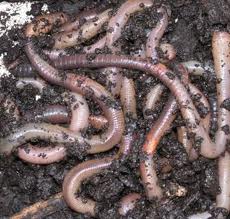By far the most important component of any vegetable garden is the quality of the soil in which you are growing vegetables. "Organic soil" has never had any synthetic pesticides or fertilizers used in that soil, or at least it never will again. If your garden is already established; you simply stop using synthetic fertilizers and pesticides and your soil will be "organic" in one to two years.
Dig The Garden - To make a raised bed garden from scratch, you will likely need to roto-till the entire garden area to loosen what is probably fairly compacted soil. Any tool rental agency will have tillers to rent.
Add The Organic Matter - When you are roto tilling the garden area, that is the very best time to add some very important organic matter to the soil. Whole leaves, straw, compost, finely shredded bark, Canadian sphagnum peat moss or even shredded newspapder are all good candidates. It is hard to put too much organic matter in the garden's soil. An inch of leaves or straw, a half inch of peat moss or compost gives you a good start; but you can double that amount and still be doing good.
Create The Boxed Beds - Once you have built the raised beds in your garden one cardinal rule is that you will avoid as absolutely much as possible walking anywhere on that raised bed. One footstep on garden soil can compact that soil and the force can be measured down as deep as 15 inches.
Apply Organic Mulch - Once you have established your garden plants, you will apply 2 to 3 inches of organic mulch over the entire surface of all of your raised beds. That mulch should be in place for all the 365 days of the year; so when it is less than 2 inches it needs to be replenished. That mulch is what gets pulled down into the soil by the earthworms to feed the billions and billions of beneficial soil microbes you need to have truly healthy plants.
How Do You Know You Have Terrific Organic Soil?
 It is easy to measure the quality of your garden soil. You count the number of earthworms residing in one cubic foot of that soil. Do this in the spring or in the fall. Five earthworms per cubic foot is considered the minimum number of worms to indicate a fairly healthy productive soil. Ten earthworms per cubic feet is very good, but most organic gardeners will find in two or three years of adding organic mulch to the garden they will have over 15, even 20, earthworms per cubic foot. At that point you never need to add any fertilizer. You just keep your mulch over 2 inches.
It is easy to measure the quality of your garden soil. You count the number of earthworms residing in one cubic foot of that soil. Do this in the spring or in the fall. Five earthworms per cubic foot is considered the minimum number of worms to indicate a fairly healthy productive soil. Ten earthworms per cubic feet is very good, but most organic gardeners will find in two or three years of adding organic mulch to the garden they will have over 15, even 20, earthworms per cubic foot. At that point you never need to add any fertilizer. You just keep your mulch over 2 inches.

